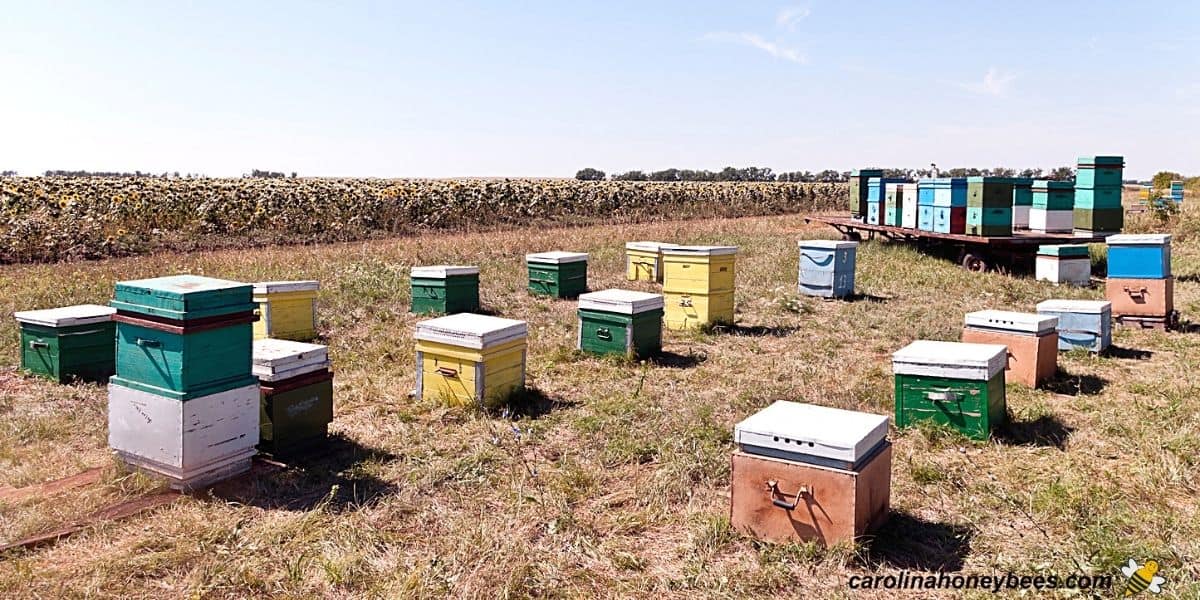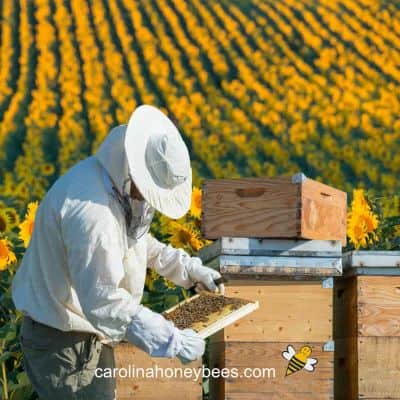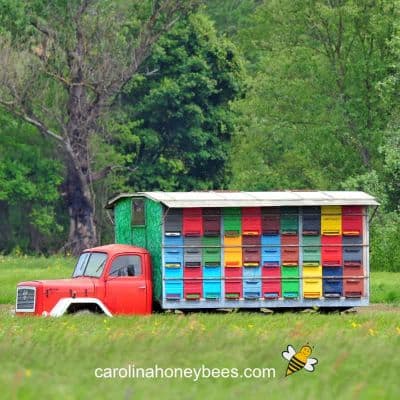What is an Apiary?
The word apiary holds a special place in the heart of any beekeeper. In reality, it is much more than just a field with lots of bee boxes. This article takes you on a journey to learn “what is an apiary“, where does the term come from and more about these lively bee places.

Keeping honey bees is one of the oldest hobbies on the planet and apiaries have evolved over time. Yet even today, this is where you will find dedicated beekeepers engaged in the art and science of managing beehives.
Definition of an Apiary
An apiary is a place where beehives are kept and managed by a beekeeper. But, the first time you hear this word you may not associate it with honey bees.
I don’t blame you – it seems a bit weird until you learn more about the origin. The word is sometimes confused with the word “aviary” (which refers to a place for birds).
In the United States, you will find the European Honey Bee (Apis mellifera) managed in manmade hives. Do you have a couple of beehives in your backyard? If so, you are the proud owner of an apiary.
Pronunciation
The base of the word “apiary” comes from the Latin word for bee – which is “api”. The proper pronunciation of apiary is: ei·pee·eh·ree.
The bees do not care how you pronounce the many different beekeeping terms. However, it is always good to know the correct pronunciation.
Origin and Etymology
The word apiary is often erroneously associated with apes or monkeys. To understand the use of this word in reference to bees, first we need to look at the word’s origin.
All animals and insects have scientific names. “Apis mellifera” is the Latin word for honey bee. The first word is the genus “Apis” meaning bee and the second word “mellifera” means honey bearing.
The term apiary is a “bee place”. It describes a plot of land that contains beehives managed by a beekeeper.
Interestingly, apiaries are not natural, they are man made. In nature, you do not find honey bee colonies living close together.
By spreading their colonies out over more land, there is less competition for food and resources the bees must collect. In a natural setting, it is rare to find more than 2 honey bee colonies within a square mile of land.
However, beekeepers often keep many more beehives in one location – sometimes a bit too many. Thus apiary is an industry term – similar to a beekeeper being a apiarist.
An apiary can be any size from 2 hives for a hobby beekeeper to a thousand hives for a commercial beekeeper. However, most large beekeepers haves more than 1 bee yard or apiary are this is better foraging for the bees.

Apiary or Bee Yard Advantages
In most beekeeping groups, you may never hear the word apiary. A more commonly used term is “bee yard”. There are many reasons that choosing an good apiary location is advantageous.
- easier hive management
- protection from predators
- variety in honey flavor and color
- water and forage availability
From earliest times, beekeepers learned that having hives located close together made hive management easier. For any struggling colonies, the important task of feeding bees is easier with all in one location.
If the hives need protection from predators, it is much easier to protect them in a smaller space vs having 10 hives spread out across 5 acres. A beekeeper who lives in bear country needs an electric fence.
Honey can vary in taste and color from one bee yard to another. Also, the same apiary can have honey that looks different from season to season. Weather conditions affect that amount of nectar produced by local flowers.
However, one of the factors of how much honey a hive produces in a season is relative to competition for nectar. Of course, it is only one factor but must be a consideration to avoid having too many hives in one spot.
How Apiaries Benefit Crops
Honey bees contribute billions of dollars in benefits to the agriculture industry each year. Commercial bee yards are placed near crops such as: strawberries, blueberries, oranges, melons etc.
As worker bees fly from flower to flower collecting nectar and pollen, they pollinate the flowers. This results in larger crops for farmers.
Mobile Apiaries Follow the Crop
In the US, it is common for large migratory beekeepers to move beehives from one location to another to provide bee pollination for farmers. Hives are loaded onto big trucks at night and moved to the new field.
For these beekeepers, apiary inspections are required in most states. Inspectors check the hives to screen them for disease and pests that might threaten the local bee population.
In parts of Europe, it is more common to see true apiaries on wheels where the beehives are part of the mobile vehicle. Sounds like a honey bee RV to me.

Production of Honey Specialties
Some commercial beekeepers have another reason for using temporary apiaries. Special types of honey is harvested by moving hives from one location to another for a few weeks during the honey flow.
Sourwood honey is produced in the Appalachian mountains and beekeepers in the Carolinas often take bees to the mountains for a few weeks.
The swamp lands of Georgia are the location for making Tupelo honey. Hives placed in these rich nectar areas for the brief seasons of bloom product special variety honey types. As the bloom slows in one location and starts in another-the bees follow.
Pollination Opportunities
For the crops that need insect pollination, having an apiary situated nearby is a valuable benefit to the farmer. This is also a way for beekeepers to earn money for pollination services.
Even a small-scale beekeeper may earn some dollars from placing hives near a local strawberry field etc. However, it is always important to discuss pesticide use with the farmer before placing bees.Pesticides kill many bee colonies each year.
How to Start an Apiary
Finding the best location for your hives is very important for any apiary set up. This is true regardless of how many hives you have in place.
If you have an interest in having your own apiary, these are some tips to consider as you begin.
- join a local beekeeping club
- take a beekeeping class
- read some top beekeeping books
Like many projects, success in beekeeping depends a lot on the prep work. To reap the true benefits of keeping bees, you have to know basic management tips. Learn, learn and learn some more before your bees arrive and your chances of success increase.
FAQs
An apiary is a location where beehives are kept and managed by beekeepers.
A beehive is a structure where a single colony of honey bees lives. An apiary is a location where more than one beehive is situated.
A bee farm may be called an apiary because of the origin of the word. Apiary comes from the Latin word for “apis” – bees.
Someone who has an apiary is called a apiarist (or a beekeeper).
Final Thoughts
The term apiary unveils a world of significance in the practice of beekeeping. It goes beyond terminology to the true core of our love for these winged friends. One apiary may be 2 beehives sitting in the backyard of a suburban home. While another apiary can be thousands of beehives sitting in an almond grove.

